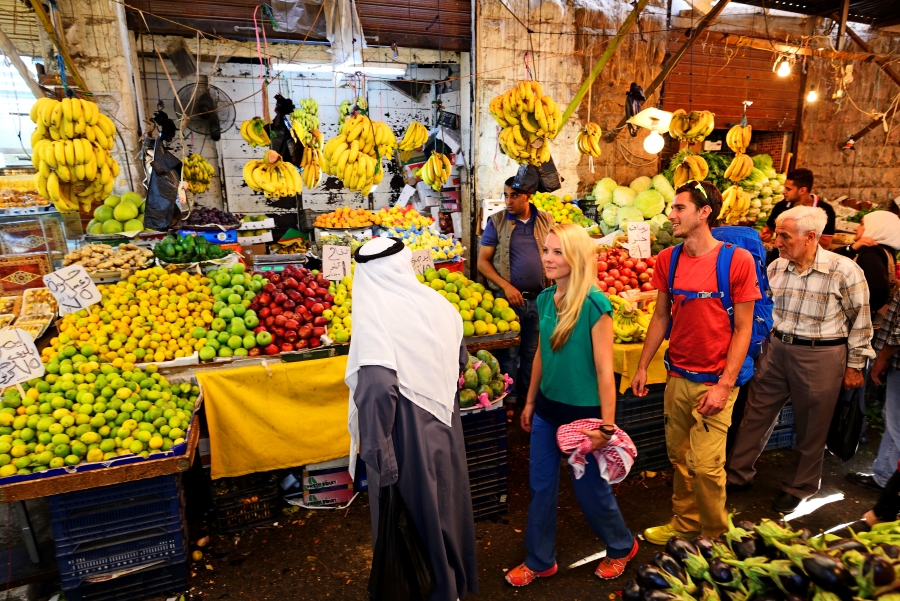JORDAN – A Culinary Experience That Will Fill Your Spirit With Joy

A combination of ancient recipes, the hospitality of the people and the opportunity to enjoy meals in timeless settings – like the rose-red deserts of Petra or the bustling souks of Amman — make the culinary experience in Jordan unique.
Commonly used by Jordanians to express their hospitality and generosity, food is often presented within minutes of a person being invited to a local house. No matter how modest their means; it is with pride that Jordanians fill your belly with food and your spirit with joy.
Jordan’s culinary scene, while sharing similarities with other Middle Eastern countries, possesses unique characteristics that distinguish it from its neighbours.
Beyond the specific dishes, a vital element of the Jordanian culinary experience is the legendary Middle Eastern hospitality. Food is not just about eating but sharing, celebrating, and coming together as a community.
So, let’s take a trip around Jordan and discover some of its regional flavours:

AMMAN
Begin your culinary journey through Jordan by learning the basics of traditional cuisine as you cook your way through the evening and then sit down to enjoy the meal at Beit Sitti, which is Arabic for “My grandmother’s house”. It is set in a traditional house in Amman where you will enjoy cooking Mezze, a main dish, and Jordan’s favorite dessert, Knafeh. Walk the streets of downtown Amman, tasting the various street foods along the way, including fresh fruit cocktails, Shawarma, Falafel, Knafeh, other sweets and so much more.
AJLOUN
Head north to Ajloun for a walk through ancient olive groves, past local villages. You will visit the soap house, where local women make olive oil soap by hand, incorporating traditional herbs and oils. Then visit the Biscuit House and try some home-baked molasses biscuits and olive oil. Have a traditional lunch at the Ajloun Rest House along the trail where local women make dishes typical to the area, such as Makmoura, which is made up of chicken or meat that is roasted in a pot and served on bread with plenty of olive oil. If it is the season, take part in the olive harvest by helping the locals pick olives.
GHOR AL MAZRA’A
Head to the village of Ghor al Mazra’a and meet the community living there, learn about their customs, and help them make Galaya Bandura, a traditional tomato dish for lunch. During the tomato harvest season, guests are welcomed to pick the tomatoes themselves.

WADI RUM
In the mood to feast like a Bedouin? Then you should try Zarb. Jordan boasts a rich Bedouin tradition and you can relive a delicious taste of it. Zarb is a lamb or chicken dish prepared in a hole dug one metre into the ground and coated with bricks to seal in the authentic smoky taste. Don’t miss the spectacular sunset while you sip on traditional Bedouin sweet tea. Consider a sumptuous lunch in a Bedouin tent. This is followed by a quick lesson on how to make traditional Bedouin coffee made from freshly roasted coffee beans and cardamom.
Not surprisingly, food in Jordan is closely tied to celebrations, festivals, and family gatherings. For instance, during the holy month of Ramadan, the evening meals (Iftar) to break the fast are a major culinary event. Traditional foods like dates, lentil soup, qatayef (sweet pancakes), and various mezze dishes are commonly served. Many restaurants off er special Iftar menus during this month.
Jordan maintains a balance between preserving its rich culinary history and embracing new influences. The warm hospitality and diverse range of flavours make Jordanian food a delightful
experience for travellers and food enthusiasts alike.
We highly recommend experiencing a traditional meal in a local home or at a Bedouin camp, as the hospitality and communal aspects of Jordanian dining are integral to understanding the
culture.


